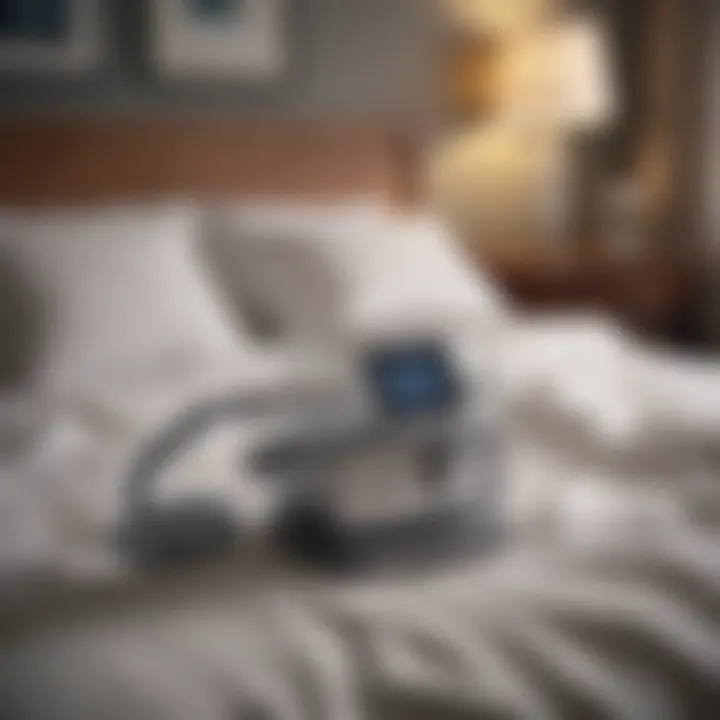CPAP Use and Its Connection to Stomach Bloating


Intro
Continuous Positive Airway Pressure (CPAP) therapy plays a crucial role in managing obstructive sleep apnea, a condition where breathing regularly stops and starts during sleep. While CPAP is effective, patients sometimes report uncomfortable gastrointestinal side effects, including stomach bloating. This article seeks to explore the connection between CPAP use and stomach bloating to better assist patients and healthcare providers in navigating this often-overlooked issue.
Research Context
Background and Rationale
Understanding the link between CPAP use and gastrointestinal symptoms is essential for improving patient comfort and adherence to therapy. When patients experience stomach bloating, it can impact their overall quality of life, potentially leading to non-compliance with their treatment. By identifying the underlying reasons for these symptoms, healthcare professionals can offer more targeted guidance and support.
Literature Review
Research on the gastrointestinal effects of CPAP therapy remains limited. Several studies highlight the possibility that changes in pressure during CPAP use may influence gas dynamics in the gastrointestinal tract. This can result in increased air swallowing or changes in gut motility. Furthermore, some patients report dietary changes after starting CPAP, which may contribute to their bloating symptoms. Past literature indicates that a minority of CPAP users experience this issue, yet it is significant enough to necessitate further investigation.
Methodology
Research Design
This article employs a systematic review approach, synthesizing existing studies on CPAP therapy and its side effects. The goal is to provide a comprehensive understanding of the physiological mechanisms behind bloating in CPAP users while addressing patients' concerns.
Data Collection Methods
Data was gathered from recent clinical trials, patient surveys, and expert interviews. Reviewing studies published on platforms like Wikipedia, Britannica, and forums like Reddit allowed for a holistic view of the patient experience. These sources revealed insights into CPAP settings, individual reactions, and other factors contributing to gastrointestinal distress.
"Addressing gastrointestinal symptoms in CPAP users is not just about comfort. It plays a crucial role in ensuring long-term adherence to therapy."
By examining the physiological basis of symptoms alongside patient experiences, this article aims to provide a detailed exploration of the relationship between CPAP use and stomach bloating.
The End
The discussion will unfold to include specific factors that may lead to stomach bloating in CPAP users, dietary considerations, and potential alternatives to improve overall comfort during treatment. Understanding these components will help practitioners better address the unique challenges faced by their patients.
Prologue to CPAP Therapy
Continuous Positive Airway Pressure (CPAP) therapy has become a standard treatment for obstructive sleep apnea, a condition that disrupts normal breathing during sleep. The significance of understanding CPAP therapy lies in its widespread use and its impact on improving sleep quality. However, not all patients experience the benefits without complications. Reports of gastrointestinal discomfort, specifically stomach bloating, warrant closer examination.
In this section, we will shed light on the definition of CPAP and its purpose in treating sleep apnea. Knowing these fundamental aspects is essential, as they help frame the subsequent discussions about potential side effects, including bloating, that may arise from its use. This foundation highlights the importance of balancing treatment benefits against any adverse effects patients may face.
Definition of CPAP
CPAP stands for Continuous Positive Airway Pressure. It is a therapy that involves the use of a machine that delivers a steady stream of air through a mask, keeping the airway open during sleep. The device maintains a predetermined air pressure, preventing airway collapse and ensuring that the patient continues to breathe properly throughout the night. This method is crucial for individuals diagnosed with obstructive sleep apnea, as it significantly reduces episodes of interrupted breathing.
Purpose of CPAP Therapy
The primary purpose of CPAP therapy is to improve oxygenation during sleep, thereby enhancing overall sleep quality. Patients with sleep apnea often experience fragmented sleep and decreased oxygen levels, leading to a cascade of health issues including daytime fatigue, high blood pressure, and cardiovascular problems. By maintaining open airways, CPAP therapy serves to mitigate these risks.
While the effectiveness of this approach is well documented, awareness of potential side effects is equally necessary. This article aims to explore how CPAP might inadvertently contribute to gastrointestinal symptoms like stomach bloating, an area that often goes overlooked in typical patient assessments.
Understanding Stomach Bloating
Understanding stomach bloating is crucial in the context of CPAP therapy. Bloating can significantly impact the comfort and quality of life for individuals using CPAP machines. Many patients experience discomfort that may divert attention from the primary purpose of the therapy, which is to improve sleep quality and reduce the risks associated with obstructive sleep apnea. Recognizing the underlying causes of bloating allows for better management strategies, ensuring patients can maximize the benefits of their CPAP treatment.
Definition and Symptoms
Stomach bloating refers to the feeling of fullness or distension in the abdominal area. This sensation can arise suddenly or develop gradually over time. Common symptoms include:
- Abdominal discomfort
- Visible swelling of the abdomen
- Excessive gas or flatulence
- Feelings of tightness or pressure
- Changes in bowel movements


These symptoms can vary greatly among individuals, making it critical to understand the specific nature of bloating in each case. For CPAP users, the relationship between therapy and gastrointestinal disruption may require careful evaluation.
Common Causes of Bloating
Bloating can have various causes, even in the context of CPAP use. Here are some of the common contributors:
- Air Swallowing: During CPAP use, some patients may inadvertently swallow air, leading to increased gas in the digestive system. This phenomenon is often noted in individuals who have anxiety or difficulties with mask fit.
- Dietary Factors: Food choices play a significant role. Certain foods, particularly those high in fiber or carbonated drinks, can exacerbate bloating. Patients need to consider how their diet interacts with CPAP therapy.
- Changes in Gut Microbiome: The balance of bacteria in the gut can shift due to various factors like medications or lifestyle. An imbalanced microbiome can lead to gas production and bloating.
- Underlying Gastrointestinal Conditions: Pre-existing conditions such as irritable bowel syndrome or lactose intolerance may become more pronounced with CPAP use.
Understanding these causes is essential for CPAP users. By identifying the specific factors leading to bloating, healthcare providers can recommend tailored solutions to mitigate discomfort.
Physiological Mechanisms of Bloating Related to CPAP
Understanding the physiological mechanisms behind bloating related to CPAP therapy is crucial for identifying and addressing potential discomfort in patients. Continuous positive airway pressure therapy is primarily designed to maintain airway patency during sleep to mitigate obstructive sleep apnea. However, this intervention may inadvertently influence gastrointestinal function. By exploring these mechanisms, healthcare providers can offer better guidance on CPAP management while minimizing gastrointestinal complaints.
Airway Pressure Effects
The airway pressure delivered by CPAP machines plays a significant role in how air is handled within the digestive system. When CPAP is properly calibrated, it supplies consistent airflow, preventing airway obstruction. Yet, elevated airway pressure can also impact not just the lungs but the esophagus and stomach as well. If the pressure is too high, it may lead to an increased likelihood of air entering the digestive tract. This influx can engender a sensation of fullness, discomfort, and ultimately, bloating.
Additionally, high pressure can disrupt normal swallowing mechanisms. A person might swallow air in the process of breathing through a CPAP device, especially if they are using a nasal mask. This air can accumulate in the stomach, causing bloating and gas. Therefore, it is essential that CPAP machines are set at the optimal pressure level, calibrated to the patient's needs, to mitigate these effects.
Swallowing Air During CPAP Use
Swallowing air, also known as aerophagia, is a common issue for CPAP users that can exacerbate the sensation of bloating. When a patient uses a CPAP device, the connection between airflow and swallow reflexes can become disrupted. Patients often breathe simultaneously through their mouths while using nasal masks, which can lead to unintentional swallowing of air.
The following factors may contribute to this:
- Mask Fit: An improper fit of the CPAP mask may lead to airflow leakage. Patients might instinctively compensate for this leak by inhaling more air through their mouths, increasing the chance of swallowing air.
- Anxiety and Tension: Some patients experience anxiety when using a CPAP device. This tension can lead to incorrect breathing techniques, resulting in more air being swallowed.
- Rapid Breathing: The need for quick breaths due to discomfort with CPAP can also lead to swallowing more air than usual.
Effective strategies for reducing bloating include ensuring the CPAP mask fits properly, selecting the right mask type, and reaching out to healthcare providers for personalized adjustments. Managing these factors can greatly enhance comfort levels and reduce gastrointestinal side effects.
"Addressing the physiological aspects of bloating linked to CPAP use not only improves patient comfort but also enhances overall therapy compliance."
By focusing on the physiological mechanisms of bloating, tailored therapeutic solutions can be implemented. This may involve adjusting the settings of the CPAP machine or modifying patient habits, ultimately improving the overall experience of using CPAP therapy.
The Role of CPAP Settings in Gastrointestinal Symptoms
Continuous Positive Airway Pressure (CPAP) therapy can be a transformative treatment for patients suffering from obstructive sleep apnea (OSA). However, the settings on these devices can influence not only the efficacy of the therapy but also gastrointestinal symptoms, including stomach bloating. Adjusting these settings can help tailor therapy to each patient's needs, potentially alleviating discomfort. Understanding the interplay between CPAP settings and gastrointestinal symptoms is vital for optimizing patient care and improving overall health outcomes.
Pressure Settings and Bloating
The pressure settings on a CPAP device directly impact how air is delivered to the airway. Each patient requires a specific level of pressure to maintain open airways during sleep. However, if the pressure is set too high, it can result in an increased volume of air being swallowed, which may lead to discomfort and bloating. Studies show that a direct correlation exists between elevated air pressure settings and the tendency to experience bloating among CPAP users.
Some patients report that their bloating symptoms worsen when using higher pressure settings. It is essential for healthcare providers to monitor these pressures and how patients respond to them. Adjusting the pressure to lower levels can sometimes yield immediate relief from bloating while maintaining the airway's integrity.
"Finding the right pressure setting can significantly impact not merely sleep quality but also gastrointestinal comfort for CPAP users."
Adjustment of CPAP Devices
Adjusting CPAP devices is a crucial step in addressing gastrointestinal symptoms like bloating. Most modern CPAP machines feature the ability to change both pressure settings and modes that can help mitigate issues.
- Auto-Adjusting Modes: Many devices now come with auto-adjust settings that adapt in real-time to the user's breathing patterns. This technology may help reduce excessive pressure during sleep, thereby minimizing the risk of bloating.
- Ramp Features: Some devices include ramp settings that allow the machine to gradually increase pressure over time. Starting at a lower pressure can give users a gentler introduction to therapy, reducing the likelihood of swallowing excess air at higher pressures.
- BiPAP Settings: For patients who experience significant bloating, switching to a BiPAP (Bilevel Positive Airway Pressure) machine might be beneficial. This device offers different pressures for inhalation and exhalation, potentially improving comfort during use.
Involving healthcare providers in this adjustment process is essential. Regular follow-ups can provide opportunities to assess the effectiveness of changes made to settings. This iterative process allows for optimizing CPAP therapy while considering the patients' gastrointestinal health.
Side Effects of CPAP Therapy and Their Impact
Understanding the side effects associated with Continuous Positive Airway Pressure (CPAP) therapy is vital for patients and healthcare providers alike. While CPAP treatment effectively manages obstructive sleep apnea, its side effects can influence patient compliance and overall health. It's essential to recognize these side effects to mitigate their impact on patients' quality of life.


A thorough comprehension of CPAP-related complications helps in developing strategies that ensure better long-term adherence to therapy. In this context, the subsequent subsections will outline common side effects and their potential connections to digestive issues, such as stomach bloating.
Common CPAP-Related Side Effects
Several side effects are commonly reported by CPAP users. These may include:
- Nasal Congestion: Many patients experience blockage or irritation of nasal passages, leading to discomfort.
- Dry Mouth: Usage of CPAP can cause dryness in the mouth due to continuous airflow.
- Skin Irritations: Face masks can result in skin rash or irritation where the mask meets the skin.
- Headaches: Some users report headaches, possibly due to insufficient oxygen supply or misfitting masks.
- Bloating: A notable issue is gastrointestinal discomfort, including bloating. This issue can arise from air being swallowed during sleep, which increases pressure in the stomach.
These side effects can range from mild inconveniences to significant disruptions in daily life. It is important for users to monitor these symptoms and communicate with their healthcare providers about any concerns.
Link to Digestive Issues
One of the more overlooked side effects of CPAP therapy is its potential impact on the gastrointestinal system. In many cases, patients note an increase in symptoms such as stomach bloating. The connection lies in how CPAP therapy works and the physiological responses that occur while using the device.
When patients use CPAP, the airway pressure can inadvertently lead to swallowing air. This ingested air can accumulate in the stomach, leading to bloating and discomfort. Additionally, the pressure settings can influence the amount of air that is pushed into the gastrointestinal tract. Adjustments to these pressure settings may be an important consideration for reducing gastrointestinal symptoms.
According to recent reports, a significant number of CPAP users have cited digestive discomfort as a concern, reinforcing the need for a deeper understanding of how CPAP impacts gut health.
"Patient feedback often reveals a strong correlation between CPAP usage and digestive symptoms, emphasizing the necessity for individualized treatment plans."
This highlights the importance of addressing not only the efficiency of CPAP therapy but also its side effects, as they can detract from the overall effectiveness of sleep apnea treatment. Coleman research suggests that better understanding and managing these side effects can improve adherence and comfort during CPAP use.
Dietary Influences on Bloating in CPAP Patients
The interplay between dietary habits and gastrointestinal symptoms is significant, particularly for individuals using Continuous Positive Airway Pressure (CPAP) therapy. This section explores how diet can impact bloating, providing insights into nutritional considerations that could alleviate discomfort associated with CPAP use.
Impact of Diet on Gastrointestinal Health
Diet plays a crucial role in the overall health of the gastrointestinal system. Consuming a balanced diet rich in fiber, fruits, vegetables, and whole grains improves digestion and can minimize bloating. Certain foods, especially those that are high in cholesterol or fat, can lead to slower digestion, causing gas and discomfort. For CPAP users, who may already experience bloating due to air swallowing during therapy, these dietary components become even more relevant.
Moreover, specific compounds in foods can stimulate gas production or exacerbate bloating. Foods containing lactose, such as dairy products, and those high in fermentable fibers, like beans and lentils, may increase gastrointestinal distress for some individuals.
"Understanding the specific influence of diet on gastrointestinal health is essential for patients using CPAP who experience bloating. Every individual responds differently to various foods."
Recommended Dietary Changes
Making simple modifications to your diet can have a substantial impact on bloating symptoms. Here are some suggested dietary changes for CPAP patients:
- Increase Water Intake: Staying well-hydrated helps digestive processes and can prevent constipation, which can contribute to bloating.
- Limit Gas-Producing Foods: Reducing the intake of cruciferous vegetables like broccoli or cabbage, legumes, and carbonated beverages may decrease gas production in the gut.
- Eat Smaller Meals: Rather than consuming large meals, smaller, more frequent meals can aid in digestion and minimize bloating.
- Consider Lactose-Free Products: If lactose intolerance is suspected, choosing lactose-free options can help alleviate bloating caused by dairy consumption.
- Incorporate Probiotics: Foods like yogurt or fermented foods such as kimchi may promote gut health, potentially reducing bloating.
By adjusting dietary choices, CPAP users can better manage bloating symptoms. These recommendations can enhance overall gastrointestinal comfort and allow individuals to focus more on their sleep therapy without additional discomfort.
Alternative Solutions for Managing Bloating
Addressing stomach bloating in patients using CPAP therapy is essential for enhancing their quality of life. This section highlights various methods to manage bloating effectively. Utilizing alternative solutions can provide relief not only for bloating but also for any associated discomfort. Identifying these solutions involves understanding their benefits and potential implications for those who suffer from bloating during CPAP use.
Exploring Other Therapies
Several alternatives to CPAP therapy exist for managing both sleep apnea and related gastrointestinal symptoms. Some notable options include:
- Oral Appliances: These devices are designed to reposition the jaw and tongue to keep the airway open during sleep. Their effectiveness varies, but many patients report fewer gastrointestinal issues when switching from CPAP.
- Behavioral Therapies: Techniques such as cognitive behavioral therapy can help patients manage the anxiety related to sleep apnea, potentially easing some symptoms of bloating.
- Positional Therapy: This therapy encourages sleeping positions that prevent airway blockage, like avoiding back sleeping. Some individuals notice decreased bloating with this adjustment.
- Exercise and Lifestyle Adjustments: Regular physical activity can improve digestion and reduce bloating. Simple changes, such as increasing water intake and reducing carbonated beverages, can have a significant positive impact.
- Herbal Remedies: Some patients find relief with certain herbal supplements, such as peppermint or ginger, which can soothe digestive disturbances.
The overall goal of exploring these alternatives is to offer patients various options for managing their symptoms. It is crucial to assess the individual needs and preferences of each patient when considering such therapies.
Consultation with Healthcare Providers
Engaging with healthcare providers is vital in navigating the options available for managing bloating associated with CPAP use. A well-informed professional can guide patients through the complexities of their symptoms, leading to tailored solutions. Here are some considerations for patients during these consultations:


- Discussing Symptoms: Patients should openly communicate their bloating and any gastrointestinal discomfort they experience while using CPAP. This information helps providers recommend appropriate interventions.
- Reviewing Current Medication: Some medications may contribute to stomach bloating. Reviewing these with a healthcare provider can identify potential adjustments that may alleviate symptoms.
- Evaluating CPAP Settings: A healthcare provider can assess whether adjusting the pressure settings on the patient's CPAP machine may help ease gastrointestinal symptoms.
- Monitoring Dietary Habits: Healthcare professionals can provide personalized dietary advice based on individual tolerance levels and sensitivities, which can minimize bloating.
Involving a healthcare provider ensures that patients receive comprehensive care in addressing their bloating issues. It encourages an ongoing dialogue that empowers patients to take control of their symptoms, potentially improving their overall sleep and health outcomes.
Patient Experiences and Reports
In the context of CPAP therapy, understanding patient experiences and reports provides insight into the real-world effects of treatment. These accounts are invaluable for both healthcare providers and patients themselves. They help underline the variability in responses to CPAP therapy, particularly regarding gastrointestinal issues like stomach bloating. By documenting these experiences, it becomes possible to identify common patterns and problems, facilitating a deeper understanding of how CPAP users navigate their health challenges.
Case Studies of Bloating with CPAP
Case studies offer a detailed perspective on individual and diverse reactions to CPAP therapy. For instance, one patient named John reported significant discomfort related to bloating after beginning CPAP treatment. After extensive discussions with his doctor, adjustments to his pressure levels were made. These changes resulted in a noticeable decrease in bloating and an improvement in sleep quality. Another case study highlighted a female patient, Sarah, who experienced bloating alongside symptoms of acid reflux, exacerbated by her nightly use of CPAP. After dietary changes and consulting a nutritionist, her symptoms improved significantly.
These case studies highlight not only the physical effects of CPAP therapy but also emphasize the interplay between therapy, diet, and individualized care. It shows that attention to symptoms like bloating is necessary for proper management, which can lead to considerable improvements in quality of life.
Patient Perspectives
Patients often share conflicting perspectives on how CPAP therapy affects their condition. For some, the therapy greatly improves their breathing during sleep, while others struggle with side effects such as stomach bloating or discomfort. Many patients recognize the importance of the therapy for managing their obstructive sleep apnea but often express frustration regarding how it affects their digestive health.
"I feel like the CPAP has helped me breathe better, but I’ve never had this much bloating before," a patient remarked in an online forum.
Such comments point to the dual realities many face when using CPAP machines. Recognizing these insights can help guide professionals in tailoring interventions. Listening to patient experiences can assist healthcare providers in making more informed decisions regarding CPAP settings and dietary recommendations to alleviate symptoms such as bloating.
In summary, exploring patient experiences enriches the understanding of CPAP’s impact beyond mere compliance. It highlights the nuanced relationship between therapy and quality of life, emphasizing that ongoing communication between patients and healthcare providers is vital for optimal care.
Research and Evidence on CPAP and Bloating
Understanding the relationship between CPAP therapy and stomach bloating is crucial for improving patient care. As more people turn to Continuous Positive Airway Pressure devices for sleep apnea, it becomes important to evaluate the side effects they may experience, particularly gastrointestinal issues. Research in this domain can provide insights into how CPAP usage influences various bodily functions.
Evidence linking CPAP use to digestive disturbances, including bloating, highlights the need for further investigation. It can help healthcare providers make more informed decisions about treatment plans and enhance the patient's overall comfort during therapy. Additionally, recognizing that dietary choices and individual physiologies can vary helps in tailoring these treatments more specifically to patient needs.
Current Studies and Findings
Recent research efforts in the area of CPAP and gastrointestinal health have resulted in multiple findings. Clinical studies have examined how CPAP devices can affect the upper gastrointestinal tract, focusing on pressure changes that may lead to discomfort. Some patients report experiencing bloating after they begin CPAP therapy, leading researchers to look into several potential causes.
- Air Swallowing: Studies found that patients might inadvertently swallow air when using CPAP at high settings. This air increases intragastric pressure, leading to feelings of fullness and bloating.
- Pressure Settings: Various research studies have indicated that different pressure settings might yield differing symptoms. Patients using lower pressure settings tend to report fewer GI symptoms than those using higher settings.
- Gastroesophageal Reflux Disease (GERD): Some patients with sleep apnea are concurrently affected by GERD. The use of CPAP may exacerbate these symptoms, leading to additional bloating.
"Effective CPAP therapy is a balancing act between airway pressure and digestive comfort."
Gaps in Research
Despite the studies conducted, significant gaps remain in the literature regarding CPAP and stomach bloating. Many findings highlight observational data without firm causal links. Furthermore, larger-scale studies are necessary to draw definitive conclusions. Specific areas that require more inquiry include:
- A longitudinal analysis of symptoms over time to assess whether bloating decreases as patients become accustomed to CPAP.
- The impact of individual differences in anatomy or health conditions on CPAP-related bloating.
- Exploration into the effectiveness of adjusting dietary habits and their compounding effects when combined with CPAP therapy.
Understanding these gaps can encourage future research that will refine our approaches and improve patient outcomes.
Epilogue and Recommendations
In examining the potential impacts of continuous positive airway pressure (CPAP) therapy on stomach bloating, it is crucial to synthesize the findings. This connection can significantly affect patient comfort and compliance. Understanding how CPAP use might contribute to gastrointestinal issues leads to more effective management strategies. Moreover, addressing these concerns not only enhances the overall effectiveness of CPAP therapy but also promotes better health outcomes for patients.
Summary of Findings
The investigation into the relationship between CPAP therapy and stomach bloating suggests several contributing factors. One important element includes the mechanisms of air pressure and air swallowing during usage. CPAP utilizes air pressure to keep airways open, yet this same pressure can lead to gas accumulation in the gastrointestinal tract. Patients often report that improper CPAP settings may exacerbate these symptoms. Furthermore, dietary habits can amplify bloating in those using CPAP devices.
Key findings include:
- Airway Pressure Effects: Increased pressure levels can lead to swallowing air, thus increasing bloating.
- Patient Adaptation: Users may need time to adjust, during which bloating may be more prevalent.
- Dietary Considerations: Certain foods can worsen symptoms, indicating a dual approach of managing diet and CPAP settings is beneficial.
Future Considerations for Patients
For patients considering CPAP therapy, monitoring gastrointestinal symptoms is vital. Awareness of individual response to CPAP usage can inform necessary adjustments in therapy. Collaboration with healthcare providers remains essential. Patients may benefit from discussing discomforts and exploring possible changes in both CPAP settings and dietary choices. Here are suggested steps:
- Regular Check-ups: Engage healthcare professionals regularly to discuss CPAP settings and symptom changes.
- Diet Monitoring: Keep a food diary to identify triggers that might contribute to bloating beyond CPAP usage.
- Open Communication: Share experiences with other CPAP users, such as through community forums on platforms like Reddit.
By addressing these considerations, patients can optimize their CPAP therapy while minimizing gastrointestinal discomfort.



